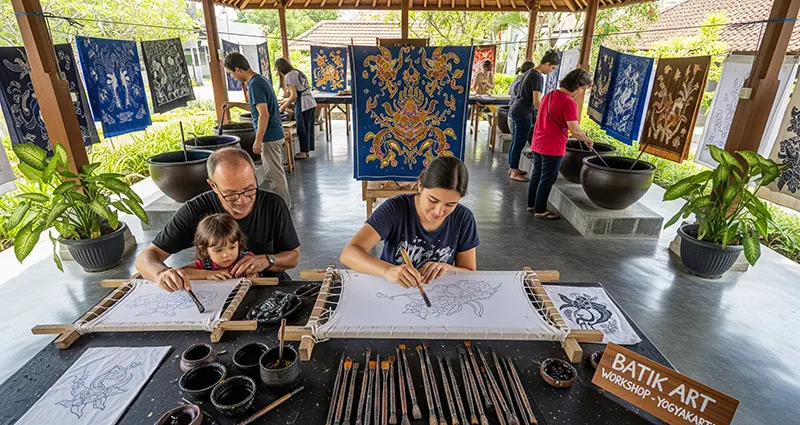Yogyakarta, a city steeped in culture and tradition on the island of Java, is widely considered the heart of Indonesia’s batik industry. This ancient art form, a UNESCO Intangible Cultural Heritage, is more than just a textile; it is a canvas of stories, philosophies, and intricate patterns passed down through generations. For visitors to Yogyakarta, the experience of a lifetime awaits: a hands-on batik workshop where you can learn the techniques, create your own unique piece, and take home a truly personal souvenir.
The Essence of Javanese Batik
The word “batik” is derived from the Javanese word “amba” (to write) and “titik” (dot). The process is a meticulous and patient one, centered around the art of wax-resist dyeing. Using a small copper tool called a canting, artists meticulously apply hot wax to a cloth, creating a pattern that will “resist” the dye. The cloth is then colored, and the wax is later removed, revealing the beautiful and complex design. This process can be repeated multiple times to add more colors and layers of detail.
Batik designs are not merely decorative. They are laden with symbolic meanings, with each pattern telling a story or reflecting a particular status. From the intricate floral motifs that symbolize beauty and prosperity to the geometric patterns representing different philosophies, learning to create batik is a journey into the soul of Javanese culture.
Where to Find a Batik Workshop in Yogyakarta
Yogyakarta is brimming with opportunities for both beginners and experienced artists to immerse themselves in batik. Many workshops are run by families who have been practicing the craft for decades, offering an authentic and intimate learning experience. Some of the most popular options include:
- Batik Winotosastro: A well-known studio and factory in the city center, offering a range of classes for all skill levels. They are committed to preserving traditional techniques and even use natural dyes.
- Tembi Village: Located just outside of Yogyakarta, this picturesque village is home to many artisans. Workshops like the one offered by Yabbiekayu provide a serene and authentic setting to learn the craft, away from the city’s hustle.
- Batik Seno Jogja: A family-run business known for its beautiful and diverse batik collections, Batik Seno also offers workshops where you can create your own design or use one of their templates.
- Giriloyo Village: Considered one of the oldest batik centers in the region, Giriloyo offers a deep dive into traditional, handmade batik with master artisans.
What to Expect from a Batik Class
A typical batik workshop in Yogyakarta provides all the necessary tools and materials, including a piece of cotton cloth, a canting, and wax. An expert instructor will guide you through each step of the process, from sketching your design with a pencil to the delicate art of applying the wax. You’ll learn to control the flow of the hot wax, a skill that requires a steady hand and a lot of patience.
Once your design is “waxed,” you’ll move on to the dyeing and coloring process. You can use brushes to add color to specific areas or dip the entire cloth in a dye bath for a single-color effect. Finally, the cloth is boiled to remove the wax, revealing your finished masterpiece. Most workshops are designed to be a few hours long, but some offer more extensive, multi-day courses for those who want to delve deeper into the craft.
Engaging in a batik workshop in Yogyakarta is more than just a fun activity; it is a chance to connect with a living tradition. You will not only gain a new skill and a cherished keepsake but also a profound appreciation for the artistry and heritage that make Javanese culture so special.










